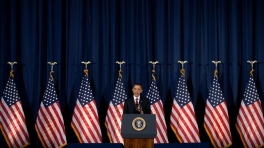By Jeff Abramson As the year progresses, we'll revisit the mid-term grades given the Obama administration on their conventional weapons policies. For the moment, the D grade on cluster munitions remains unchanged because U.S. policy is unchanged, but there is much happening: Libya
Earlier this month as air strikes against Libyan forces became increasingly likely, so did concerns that we'd see a new round of cluster munitions use, especially by the United States. The pro-Qaddafi forces to be attacked sounded very similar to those defined by Secretary Gates in 2008 as legitimate cluster munitions targets under U.S. policy:
There remains a military requirement to engage area targets that include massed formations of enemy forces, individual targets dispersed over a defined area, targets whose precise locations are not known, and time-sensitive or moving targets. Cluster munitions can be the most effective and efficient weapons for engaging these types of targets.
However, for forces engaged explicitly in protecting civilians and stopping a "massacre that would have reverberated across the region and stained the conscience of the world" (according President Obama), it would be especially difficult to defend using cluster munitions given the weapons' track record for indiscriminate harm. And thus far, ACA is unaware of any reports of U.S. use of cluster munitions in Libya. With NATO now taking charge, future use may be even less likely. More than two thirds of NATO member states have signed or ratified the Convention on Cluster Munitions (CCM), which bars the use of treaty-defined cluster munitions. The United Kingdom already ruled out using the weapons, reiterated when Prime Minister David Cameron said March 21, "We do not use those munitions." CCW Debate Continues as CCM Ranks Grow While rejecting the CCM, the United States continues to seek agreement on possible limitations on cluster munitions within the Convention on Certain Conventional Weapons (CCW), for which a group of governmental experts is meeting again this week. CCW states-parties also are headed into a review conference later this year that could mark the end of thus far fruitless discussion on a new cluster munitions protocol (so-called Protocol VI). In the latest edition of Arms Control Today, 2006 CCW review conference chairperson François Rivasseau looks at what might be feasible in the next review conference in "The Past and Future of the CCW." Also, a new report from Human Rights Watch addresses what it identifies as 5 myths about cluster munitions and the CCW, starting with "Myth 1: A CCW protocol on cluster munitions would have significant humanitarian benefits." (Keep your eye on the April edition of ACT for a letter to the editor on Rivasseau's article and the cluster munitions debate.) At the same time, the number of states ratifying the Convention on Cluster Munitions has grown to 55, with Portugal, Mozambique, and Lithuania depositing necessary legal documents this month. In Australia, however, controversy is brewing over a Senate Foreign Affairs, Defence and Trade Committee report on proposed legislation to implement the CCM. Campaigners are criticizing the draft bill for allowing Australian troops to provide active assistance to non-CCM allies such as the United States in combat operations, as well as permit foreign forces to transit and stockpile cluster munitions through or on Australian soil. Although the treaty does allow for cooperation with foreign forces when CCM states-parties do not "expressly request the use of cluster munitions where the choice of munitions used is within its exclusive control," John Rodsted, Cluster Munitions Coalition Australia spokesperson, said yesterday "As drafted, the bill completely ignores the basic aim and spirit of the Convention on Cluster Munitions." U.S. Cluster Munitions Protection Act Again this year, members of the U.S. Congress have introduced the Cluster Munitions Civilian Protection Act (S.558, H.R.996), which among a number of things prohibits the U.S. use of cluster munitions that fail to detonate as intended more than 1 percent of the time (current U.S. policy does not set such a hard usage deadline until 2018). With 22 sponsor and co-sponsors in the Senate and 3 in the House, prospects for immediate passage may not be high, but the resolutions deserve to be watched. When discussing the Senate resolution March 15, longtime landmines and cluster munitions treaties champion Senator Patrick Leahy of Vermont said:
Some have dismissed the Cluster Munitions Convention as a pointless exercise, since it does not yet have the support of the United States and other major powers such as Russia, China, Pakistan, India and Israel. These are some of the same critics of the Ottawa treaty banning antipersonnel landmines, which the U.S. and the other countries I named have also refused to sign. But that treaty has dramatically reduced the number of landmines produced, used, sold and stockpiled, and the number of mine victims has fallen sharply. Any government that contemplates using landmines today does so knowing that it will be condemned by the international community. I suspect it is only a matter of time before the same is true for cluster munitions.
Other
CNN iReport Community Choice Winner: Clearing Cluster Bombs on the Ho Chi Minh Trail
Rounding out the news on cluster munitions, earlier this month an independent video report on clearing cluster munitions in Laos won the Community Choice award in the first ever CNN iReport competition. Also, for those interested in working on these issues, the Cluster Munitions Coalition and International Campaign to Ban Landmines are currently seeking to fill 10 positions, closing date April 1.

